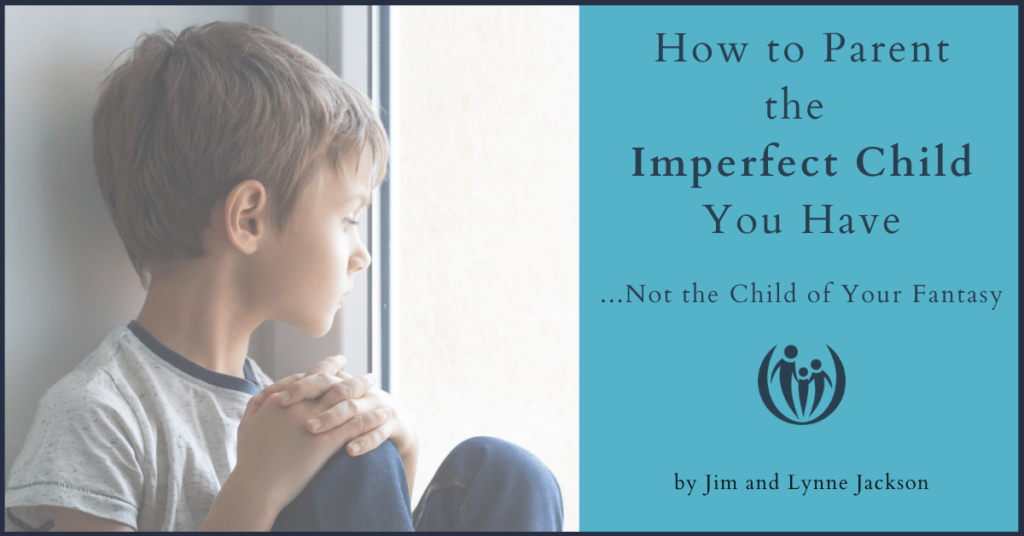
How to Parent the Imperfect Child You Have

We all have dreams for our children. Dreams that begin long before a child takes their first breath. But what if the child you have isn’t the child you dreamed of? How do you parent the child you have?
Parents wish the very best for their children; that they’ll be “successful”, happy, well-liked, and love Jesus. But these wishes don’t always match the reality of the child they have birthed or who joined their family through adoption. Thankfully our kids often demonstrate how much “better” they are than what we had even hoped. But other times, it’s downright hard to parent the child you have. Especially when they are not the child you imagined they would become.
Sometimes our wishes for our kids feel basic and obvious: that they will be able to hold down a job, manage their finances well, be a productive member of society, and find true joy in God and relationships. At other times our wishes may be more lofty: first chair in clarinet, starting on the varsity football team, or getting high marks in school.
These are not bad wishes to have for your kids. The problem is, when we run into parenting challenges, both the basic dreams and the lofty dreams may feel threatened. It is easy to panic, become anxious, and respond with fear out of that anxiety.
What if he can’t get into college? What if she becomes a shopaholic? What if my child is just a big failure?
The pressure of perfect parenting is crushing
This fear and anxiety often causes us to work harder to keep our dreams alive. We put extra pressure on ourselves and on our children to live up to our expectations. We do all we can to avoid our imagined future nightmares. Particularly with a firstborn child, we feel compelled to be perfect parents with a child who displays that perfection to the world.
But at some point, it becomes clear that our wishes are more fantasy than reality, and we begin to realize that perfection is not an option. Regardless of what our goals are for our children, it seems perfection eludes us.
Look to Jesus’ example
Instead of this realization driving us to despair, we can look to Jesus’ example. Jesus clearly used very ordinary, sassy, and imperfect people to accomplish great things! His key leader, Peter, was impulsive and got himself in trouble numerous times. Think about Peter whipping out his sword to cut off the High Priest’s servant’s ear! Or how about the time Peter decided to argue with Jesus, only to have Jesus respond, “Get behind me, Satan!”
And yet, Peter is who Jesus chose to lead the new Church. I’ve often wondered what it was like to be Peter’s mother when he was young!
The power of accepting and parenting the child you have
One mom wrote to us about her son, whom she’d often struggled to accept as he was. They live in a small apartment, and he has three sisters. He has big emotions and, more than his sisters, needs more time to run, throw, and use all those big muscles.
His mom writes,
“Sometimes he is not ‘out of control,’ but sparks conflict among his three sisters in ways that make me cringe from the other room. Definitely thoughts like, ‘Again!!!?’ and labels born of despair like ‘Those kids are so hot-headed!’ or ‘That boy!!!’ accompanied by feelings of shame of being a bad ‘Christian witness’ among the non-believing neighbors and weariness to deal with their constant raised voices.
Last spring, there was an important moment of revelation when I was reading the chart Connected Families has about negative core beliefs. They all fit my husband and me to a ‘T’.
It struck me that when I say, ‘That boy!’ in my negative thoughts, it echoes the accusatory, self-distancing label the Prodigal Son’s older brother uses to refer to the younger. ‘Your son!’ he spits. You put the adjective far away—that one, yours, not mine. And the loving Father gently corrects him without saying any more words: ‘Your brother…’
And so in prayer that evening, I was able to re-receive my son at his birth, declaring my delight over him—his personality being God’s choice for us.”

Let go of those dreams and embrace your imperfect child
In order to release yourself and your child from impossible expectations, let go of the dreams and accept yourself and your child as you really are—roses, thorns, and all!
It’s easy to love beautiful rose blossoms. No special grace needed. When you love your child’s “thorns,” it’s a holy reflection of God’s unconditional love for you. And all of your imperfections. Only when you rest in God’s grace can your love and dreams for your child be communicated freely, with your child’s best interests in mind.
What if your only wish was for your child to be whomever God was calling them to be…even if that doesn’t look the way you imagined?
When you stop wishing for the child of your dreams
What happens when parents don’t wish for a perfect child? What happens when you learn to parent the child you have?
You begin to:
- Accept the reality that neither your child nor you will ever entirely “get it right.” This may mean letting go of a false standard for yourself, or perhaps even grieving as you release hope for the “child of your dreams.” Does this process seem overwhelming? We encourage you to seek counseling from a trusted professional to help you navigate these emotions.
- Learn that self-worth does not come from your child’s behavior but from God’s delight in you! And God’s delight in you isn’t based on performance or anything you do. As you untie your self worth from your child’s behavior, you will honestly be able to say, “I can be ok, even if my child is not.”
- Embrace core beliefs that reflect God’s sovereignty:
- “This child is a gift, created for eternally valuable purposes.”
- “I am a gift to my child, uniquely matched to my child for God’s good purposes.”
- Look with faith for what God might be accomplishing in your life through the challenges of parenting the child of your reality. Julie Barnhill quoted an insightful mom encouraging another mom, “God didn’t give you your child so you could fix him, or whip him into shape. God gave you your child to make YOU more like Jesus!”
Loving the child of your reality
As young parents, one of the challenges we experienced was learning to embrace “the children of our reality” and ourselves (“the parents of our reality”). And figuring out how to do this through a lens of God’s grace and truth. It was a difficult but quite transforming process in those overwhelming, often exasperating, early years. But the fruit of learning to think this way over the years was a deep level of freedom and joy.
Remember: Freedom, joy, and connection come alive when you embrace yourself as an imperfect parent, parenting the imperfect children you have, on a journey together to discover the love of God.
What are your parenting strengths?
You’ve got them. Knowing your strengths will help you become the best parent you can be. Knowing your parenting challenges is useful information too. Take our FREE ASSESSMENT.






